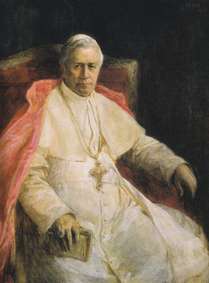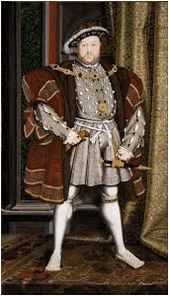 Pope Saint Pius X
Pope Saint Pius X Editor's Note: The following is a modified abstract of a paper presented at a conference held by Christ the King Law Center (CKLC) on October 8, 2016 titled Make America Catholic Again!
Pope Leo XIII in his Encyclical Immortale Dei wrote that one of the "chief duties" or rulers was to "favour religion, to protect it, to shield it under the credit and sanction of the laws, and neither to organize nor enact any measure that may compromise its safety. This is the bounden duty of rulers to the people over whom they rule." [1]
Ideally the State and the Church must be united. Blessed Pope Pius IX's Syllabus of Errors condemns the proposition that the "Church ought to be separated from the State, and the State from the Church." [2] Pope Saint Pius X taught:
- "That the State must be separated from the Church is a thesis absolutely false, a most pernicious error. Based, as it is, on the principle that the State must not recognize any religious cult, it is in the first place guilty of a great injustice to God; for the Creator of man is also the Founder of human societies, and preserves their existence as He preserves our own. We owe Him, therefore, not only a private cult, but a public and social worship to honor Him. Besides, this thesis is an obvious negation of the supernatural order. It limits the action of the State to the pursuit of public prosperity during this life only, which is but the proximate object of political societies; and it occupies itself in no fashion (on the plea that this is foreign to it) with their ultimate object which is man's eternal happiness after this short life shall have run its course. But as the present order of things is temporary and subordinated to the conquest of man's supreme and absolute welfare, it follows that the civil power must not only place no obstacle in the way of this conquest, but must aid us in effecting it. The same thesis also upsets the order providentially established by God in the world, which demands a harmonious agreement between the two societies. Both of them, the civil and the religious society, although each exercises in its own sphere its authority over them. It follows necessarily that there are many things belonging to them in common in which both societies must have relations with one another. Remove the agreement between Church and State, and the result will be that from these common matters will spring the seeds of disputes which will become acute on both sides; it will become more difficult to see where the truth lies, and great confusion is certain to arise. Finally, this thesis inflicts great injury on society itself, for it cannot either prosper or last long when due place is not left for religion, which is the supreme rule and the sovereign mistress in all questions touching the rights and the duties of men. Hence the Roman Pontiffs have never ceased, as circumstances required, to refute and condemn the doctrine of the separation of Church and State. Our illustrious predecessor, Leo XIII, especially, has frequently and magnificently expounded Catholic teaching on the relations which should subsist between the two societies. "Between them," he says, "there must necessarily be a suitable union, which may not improperly be compared with that existing between body and soul. - Quaedam intercedat necesse est ordinata colligatio (inter illas) quae quidem conjunctioni non immerito comparatur, per quam anima et corpus in homine copulantur."He proceeds: "Human societies cannot, without becoming criminal, act as if God did not exist or refuse to concern themselves with religion, as though it were something foreign to them, or of no purpose to them.... As for the Church, which has God Himself for its author, to exclude her from the active life of the nation, from the laws, the education of the young, the family, is to commit a great and pernicious error." [3]
Msgr. John A. Ryan wrote:
- The State should officially recognize the Catholic religion as the religion of the commonwealth: accordingly it should invite the blessing and the ceremonial participation of the Church for certain important functions, such as the opening of legislative sessions, the erection of public buildings, etc., and delegate its officials to attend certain of the more important festival celebrations of the Church; it should recognize and sanction the laws of the Church; and it should protect the rights of the Church, and the religious as well as the other rights of the Church's members. [4]
The above rule is not absolute. It applies to a state where the overwhelming majority of the population is Catholic. [5] Where Catholics are in the minority the state does not have to give official recognition to the Catholic faith and in any event any attempt to do so may be met with civil unrest. [6] Certainly such a condition exists in the present day United States. However, if conditions change then the "people would do wrong by voting against governmental recognition of the true religion..." [7]
An example of a legitimate law which favors the true religion might look is the Spanish Charter of 13 July 1945 (Fuero de los Espanoles). Article 6 of the Charter stated:
- 1. The profession and practice of the Catholic Religion, which is that of the Spanish State, will enjoy official protection.
- 2. No-one shall be disturbed for his religious beliefs nor the private exercise of his religion. There is no authorization for external ceremonies or manifestations other than those of the Catholic religion. [8]
Unfortunately Spain later changed its law to separate the Church from the state. After the death of the Spanish leader General Francisco Franco the new government adopted a constitution which decreed that there will be no State religion. [9]
However some countries today still give the Church official recognition as the religion of the state. One such country is the Dominican Republic located in the Carribean. On 16 June 1954 representatives from the Dominican Republic and the Holy See signed an agreement called a concordat. Article I of the concordat stated the following:
- "The Holy Roman Catholic and Apostolic Religion is the Religion of the Dominican Republic, and shall enjoy the rights and prerogatives due to it under Divine and Canon Law. [10]
This concordat was challenged in 2006 by a protestant group as being a violation of the Dominican constitution's guarantee of "freedom of conscience and religion." But in 2008 the Dominican Supreme Court rejected this challenge and upheld the concordat by a 15-2 decision. [11]
The Dominican republic later continued to uphold the laws of God in its constitution when it amended its constitution on 21 April 2009 to protect the innocent and the sanctity of the family. Article 30 of the new constitution guaranteed the right to life from the moment of conception until death. [12] Article 44 of the new constitution defined the family as the fundamental unit of society and paragraph 1 of that same article defined marriage as the union of a man and a woman. [13] This constitution was instrumental in stopping an attempt to amend the Dominican Republic's criminal code to permit abortions if a "pregnant woman's life". In that case a Dominican Court blocked the law after they backed a complaint by a pro-life group that argued the attempt to permit abortions in such circumstances violated the consitution's right to life provision. [14]
[1] Leo XIII, Encyclical Immortale Dei (1885) p 6.
[2] Syllabus, number 55.
[3] Pius X, Encyclical Vehementor Nos (1906) p 3.
[4] M. Davies, The Second Vatican Council and Religious Liberty 30 (1992).
[5] Ibid.
[6] Mackseiy, C. "State and Church." The Catholic Encyclopedia. New Advent, 1912. Web. 10 May 2018.
[7] Connel, F. "Reply to Father Murray." The American ecclesiastical review 126 (1952): 57.
[8] M. Davies, The Second Vatican Council and Religious Liberty 275 (1992).
[9] Ibid 276.
[10] "Trujillo's Concordat (1954)." Concordat Watch-Dominican Republic. Concordat Watch. Web. 10 May 2018. [CKLC comment: This article and website are hostile to the Church and concordats with the Church in general.]
[11] Friedman, Howard. "Dominican Republic High Court Upholds Country's Concordat With Vatican." Religion Clause. Howard Friedman. 24 October 2008. Web. 14 May 2018.
[12] Hoffman, Matthew Cullinan. "Dominican Republic Enshrines Right to Life in its Constitution." Life Site News. LifeSiteNews.com. 22 April 2009. Web. 16 May 2018.
[13] "Dominican Constitution Amended in Line with Church doctrines." Concordat Watch-Dominican Republic. Concordat Watch. Web. 16 May 2018. [CKLC comment: This article and website are hostile to the Church and concordats with the Church in general.]
[14] The Associated Press. "Dominican Republic: Court Blocks an Abortion Law." World Briefing. New York Times. 3 December 2015. Web. 16 May 2018.By: Christ the King Law Center (CKLC)
Editor's Note: The following is a modified abstract of a paper presented at a conference held by Christ the King Law Center (CKLC) on October 8, 2016 titled Make America Catholic Again!

 RSS Feed
RSS Feed
